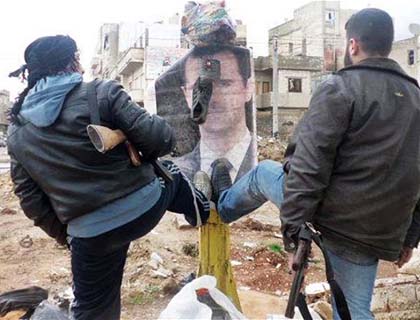MARRAKECH, Morocco - More than 100 countries have recognised a new Syrian opposition coalition, opening the way for greater humanitarian assistance to the forces battling Bashar Assad and possibly even military aid, France's foreign minister says.
The formation of the Syrian National Coalition appears to be the step the international community has been waiting for to extend deeper assistance to the opposition, which before had been criticised for not being sufficiently organised or representative.
French Foreign Minister Laurent Fabius called the Friends of the Syrian People conference meeting in Marrakech, Morocco "extraordinary progress." He noted that the European Union is now renewing its weapons embargo on Syria every three months rather than annually to give them more flexibility as the situation on the ground changes.
"We want to have the ability to continue or to change our attitude on this point - the fact that the coalition, which is asking for the right to defend itself - is now being recognised by a hundred countries, yesterday the US and first France, I think this is a very important point."
The conference comes hours after President Barack Obama declared its new coalition was the "legitimate representative" of its country's people.
At the conference, Syrian opposition spokesman Walid al-Bunni called for "real support" and not just recognition. The Syrian National Coalition, formed in November during a conference in Doha, Qatar, has been calling for increased international support, including military material.
"We need not only bread to help our people," opposition member Saleem Abdul Aziz al Meslet told The Associated Press. "We need support for our Syrian army - we need to speed up things and get rid of this regime."
Some of that support appeared to be forthcoming with Saudi Arabia announcing a $US100 million ($A95.44 million) aid package at the conference.
Western countries have been reluctant to send arms to Syria, not the least because of their experience in Libya where the West actively backed one side in a civil war in a country that later became awash in militant groups.
There has been a noticeable hardening of the Western rhetoric though as the war in Syria has ground on for nearly two years killing more than 40,000 people according to estimates by rights groups and as the rebels score new battlefield victories, there are fears that Assad may turn to his chemical weapons arsenal.
In her speech at the conference on the severe humanitarian needs of Syria's people, coalition vice president Suheir Attasi said that they have now created the necessary relief structures on the ground to receive aid, as had been requested by the international community.
Obama's announcement follows his administration's blacklisting of a militant Syrian rebel group with links to al-Qaeda. That step is aimed at blunting the influence of extremists.
Fabius, the French minister, said there were differences of opinion among participants over the US move, with a number of Arab countries objecting to the terrorist label and the new Syrian opposition leader pointing out that it was hard to call a group making an important contribution to the fight, terrorists.
The new president of the coalition, Mouaz Khatib, did however condemn "all forms of extremism" in his conference speech, a veiled reference to the jihadi groups operating in the country and he specifically called for reconciliation with the country's Alawite minority from which Assad comes, calling on them to fight with the opposition.
"We call on them to accept the extended hand and work together against the violence of the regime," he said.
US Secretary of State Hillary Rodham Clinton was expected to attend the conference, but cancelled following an illness and will be represented by Deputy Secretary of State for the Middle East, William Burns.
Russian Foreign Minister Sergey Lavrov said on Wednesday the recognition contradicted earlier international agreements that foresee the "commencement of an all-Syria dialogue" that would include all sides of the conflict, in which more than 40,000 people have died so far.

